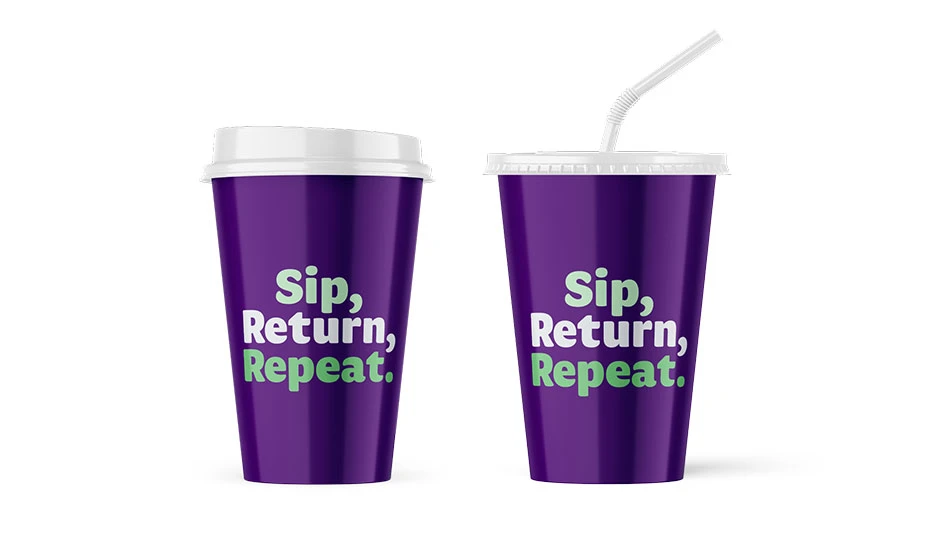
Photo courtesy of returnmycup.com
The Petaluma Reusable Cup Project aims to make reusable cups the default option in national and local restaurants across Petaluma, California.
Starbucks, The Coca-Cola Co., PepsiCo and Peet’s Coffee, along with other global and local brands and restaurants, are collaborating in The Petaluma Reusable Cup Project from the NextGen Consortium, led by the Center for the Circular Economy at Closed Loop Partners, to drive reuse.
Starting Aug. 5, more than 30 restaurants in Petaluma will swap single-use cups for to-go reusable cups at no cost to customers. Widespread return points also will be available across the city.
The initiative runs until November and will collect baseline data that measures customer participation and the environmental impact of offering reusables as the default choice for customers, testing whether the model is operationally viable for scale. Data from the initiative can be leveraged by businesses and regulators to support them as they design new reuse systems and draft well-informed packaging regulations.
The mix of large national chains, local independent restaurants, convenience stores, community hubs and public locations makes this initiative distinctly powerful in shaping consumer habits and cultural norms, the companies say. The initiative was made possible through extensive public and private collaboration, with support and engagement from the city of Petaluma, Zero Waste Sonoma, Recology, community groups and local businesses.
“It takes an entire community to build the future of reuse that we want to see,” Starbucks Chief Sustainability Officer Michael Kobori says. “Our environmental promise is core to our business, and that’s why we’re working toward a future vision of every Starbucks beverage served in a reusable cup. Together with fellow foodservice brands, local stores and community stakeholders, we’re leading this initiative to help further unlock behavior change toward reusables, making it easy for our customers, and any customer, to choose to reuse and reduce waste.”
The city says its businesses and consumers are receptive to adopting reuse, given the policy environment promoting the phaseout of nonrecyclable single-use packaging.
“To create a world without packaging waste, we need to ensure that food packaging reuse systems are scaled in a way that creates a positive environmental impact—meeting the current needs of people while driving a cultural shift toward reuse,” Managing Director and Head of the Center for the Circular Economy at Closed Loop Partners Kate Daly says. “By testing reuse across an entire city in partnership with key stakeholders from the community and industry, we can scale reuse collaboratively through thoughtful experimentation, building a future where reuse is the norm.”
The Petaluma Reusable Cup Project will install more than 60 cup return bins across Petaluma. The returned reusable cups will be collected, washed and recirculated for future use by participating businesses and customers. Muuse, a winner of the 2018 Next Gen cup innovation challenge, was selected by the NextGen Consortium to manage all servicing and reverse logistics for the initiative.
“The city of Petaluma is laying the groundwork to make cup reuse not only an option but the default,” Petaluma Mayor Kevin McDonnell says. “We have an amazing, engaged community, and we look forward to assisting the success of this program, alongside our local restaurants and participating global brands that service our community.”
The city previously participated in a returnable cup test at participating Starbucks locations in 2023. Prior collaboration with local stakeholders has helped adapt the initiative to local policy and infrastructure, identify optimal return points across the city and engage the broader community.
“Imagine a neighborhood where all to-go cups are reusable, and returning these cups required no extra steps,” Zero Waste Sonoma Executive Director Leslie Lukacs says. “By making reusable cups as convenient and accessible as single-use, we can offer an alternative for residents when they forget to bring their own cups with them. Universal accessibility creates the foundation for a cultural shift towards reuse.”
The NextGen Consortium says it will continue its work and collaboration with stakeholders from across the reuse value chain, from innovators and activists to global brands and policymakers, to effectively scale reuse systems that are better for the environment.
“Transitioning to returnable packaging systems is a critical part of reducing single-use packaging waste, and we need to focus on supporting the operations behind it,” Muuse COO and co-founder Brittany Gamez says. “These systems must be thoughtfully and responsibly implemented to ensure we are minimizing our impact of creating more waste in the process. It is through initiatives like this that we can identify what is needed to operationalize shared systems at this level and inform how reuse is implemented at scale.”
Latest from Recycling Today
- Orion ramping up Rocky Mountain Steel rail line
- Proposed bill would provide ‘regulatory clarity’ for chemical recycling
- Alberta Ag-Plastic pilot program continues, expands with renewed funding
- ReMA urges open intra-North American scrap trade
- Axium awarded by regional organization
- Update: China to introduce steel export quotas
- Thyssenkrupp idles capacity in Europe
- Phoenix Technologies closes Ohio rPET facility





